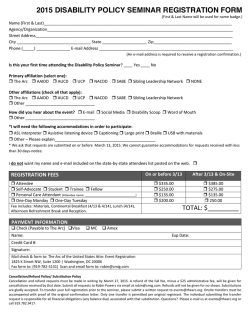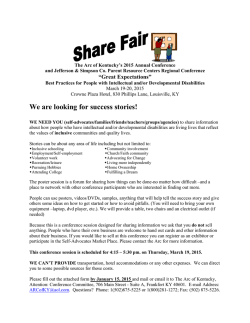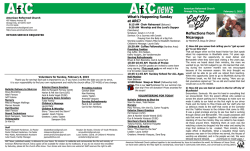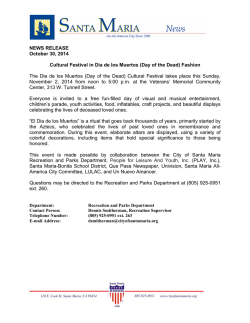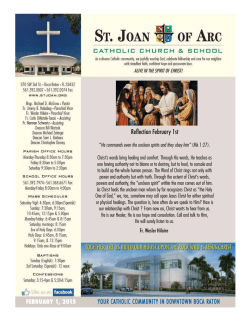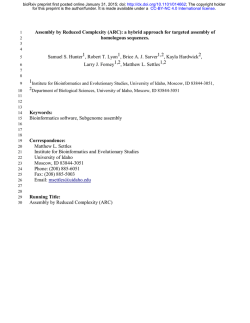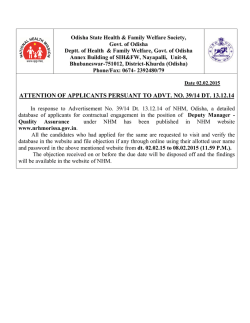
PDF Format - Australian Research Council
FREQUENTLY ASKED QUESTIONS for Discovery Projects commencing in 2016 Version 2 Release date: 30 January 2015 All Participants should read Parts A and C of the Funding Rules for schemes under the Discovery Program for the years 2015 and 2016 - Australian Laureate Fellowships, Discovery Projects, Discovery Early Career Researcher Award and Discovery Indigenous (the Funding Rules). The Instructions to Applicants also contain important information for Research Office staff and individual Participants preparing Proposals. The Australian Research Council (ARC) does not respond to queries from individual Participants. Individual Participants should direct all queries regarding ARC funding schemes to their Administering Organisation’s Research Office (or equivalent). If further information regarding the scheme is required, the Research Office should contact the Discovery Projects team. Information regarding the Research Management System (RMS) is available at the ARC website, or by contacting the RMS helpdesk for assistance. As soon as information regarding important scheme dates becomes available, the ARC website will be updated at Important Dates page. The ARC will also notify the Research Administrators’ Network of any updates via an email message. This Frequently Asked Questions document will be updated as required. Details of any amendments will be appended to this document. Page 1 of 11 CONTENTS 1. DP INVESTIGATORS - ELIGIBILITY ................................................................................................... 3 2. CROSS-SCHEME ELIGIBILITY ............................................................................................................ 4 3. BUDGET ................................................................................................................................................... 4 4. SUBMISSION REQUIREMENTS .......................................................................................................... 8 5. MEDICAL AND DENTAL RESEARCH ...............................................................................................10 CHANGES TO DOCUMENT........................................................................................................................11 Page 2 of 11 1. DP INVESTIGATORS - ELIGIBILITY 1.1 Can I be a CI on a Discovery Projects Proposal while undertaking a higher degree by research? What does ‘Higher Degree by Research Conferral Date’ mean? No, a Chief Investigator (CI) cannot be undertaking a higher degree by research (HDR) as at 1 January 2016. Researchers must have their higher degree by research conferred by the Commencement Date of the Project (1 January 2016) as described in subsection C6.2.2 of the Funding Rules. The ‘HDR Conferral Date’ is the date that is noted on the HDR testamur. The ‘HDR Conferral Date’ is not the date of submission of the thesis, nor the date the thesis was accepted by the examination board. 1.2 I meet the eligibility criteria for a CI on a Discovery Projects Proposal, but I do not want to dedicate all my time to a project as a CI, so can I apply as a PI? No. Your employment status is the main determinant of whether you are eligible for a Chief Investigator (CI) or a Partner Investigator (PI) role. The difference between these roles is not related to your intended level of involvement or full time equivalent (FTE) in the Project. If you meet the eligibility criteria for a CI at any Eligible Organisation, you are not eligible to be a PI. 1.3 Do I need to meet the eligibility criteria for a CI at the Administering Organisation for the Proposal? A researcher who meets the eligibility criteria for a Chief Investigator (CI) at any Eligible Organisation as at 1 January 2016 is eligible to apply as a CI on a Discovery Projects Proposal administered by that Organisation or by any other Eligible Organisation. Note, a researcher who meets the eligibility criteria for a CI at any Eligible Organisation as at 1 January 2016 is not eligible to apply as a PI on a Discovery Projects Proposal administered by that Organisation or by any other Eligible Organisation. The eligibility criteria for a CI are described at subsection C6.2 of the Funding Rules. 1.4 What do you mean by ‘Emeritus’ in subsection C6.2 of the Funding Rules? The ARC will recognise as an ‘Emeritus’ any Honorary position that gives full academic status, as certified by the Deputy Vice-Chancellor (Research) in the Proposal. These positions are typically held by former academic staff members that continue to have an ongoing relationship with the institution. For ARC purposes this relationship should include access to research support comparable to employees, and would also normally include participation in postgraduate supervision. The person would not normally be eligible if they hold a substantive (paid) position elsewhere. 1.5 If I hold a paid Visiting appointment for at least 0.2 FTE at an Eligible Organisation am I eligible to apply for a CI role on a Discovery Projects Proposal? Yes. A researcher holding a paid Visiting appointment for at least 0.2 FTE at an Eligible Organisation is eligible to apply for a Chief Investigator (CI) role on a Discovery Projects Proposal providing that the researcher also fulfils the other CI eligibility requirements described in subsection C6.2 of the Funding Rules. 1.6 I am holding a set duration contract at an Eligible Organisation that will be valid as at 1 January 2016, am I eligible to apply for a CI role on a Discovery Projects Proposal? Yes. A researcher holding a fixed duration contract for at least 0.2 FTE at an Eligible Organisation valid as at 1 January 2016 is eligible to apply for a Chief Investigator (CI) role. If the Proposal is successful, CIs and PIs must meet the eligibility criteria for the duration of the Project. If a CI’s or PI’s contract expires during the Project and is not extended, the Administering Organisation must promptly notify the ARC of the change of circumstances. Page 3 of 11 2. CROSS-SCHEME ELIGIBILITY Note: please refer to the Cross-scheme Eligibility Frequently Asked Questions for details concerning cross-scheme limits. 2.1 Are Future Fellows, Australian Laureate Fellows or Discovery Indigenous Award (DIA), DECRA recipients eligible to apply for funding as a CI on a Discovery Projects Proposal? Yes. In order to be eligible as a Chief Investigator (CI), Future Fellows, Australian Laureate Fellows or Discovery Indigenous Award/DECRA recipients must, at the time of submission of Discovery Project Proposals, evaluate if they will meet the eligibility criteria for CIs at the Commencement Date as per Table 1 of the Cross-scheme Eligibility Frequently Asked Questions (FAQs). Applicants must also comply with the specific limits on the number of projects/proposals permitted. For further details concerning project/proposal limits please refer to Question 1.3 of the Cross-scheme Eligibility FAQs. 2.2 I am a Chief Investigator on a Proposal and am associated with a Commonwealthfunded Research Centre. Do I need to provide a letter from the Centre Director to confirm that the proposed research is not currently funded by the Commonwealth? You do not need to provide a letter from your Research Centre Director. However, the Administering Organisation is required to certify that the proposed research does not duplicate Commonwealth-funded research including that undertaken in a Commonwealthfunded Research Centre. 3. BUDGET 3.1 I am considering applying for a four or five year Discovery Project grant. What are the main attributes of such proposals? Applicants should explain why the research is of such nature, scale and scope as to require four or five years, as applicable. Typically longer grants would involve phased or staged research, as an integral part of the research plan. The duration must be fully explained in the Project Description and Budget Justification sections of the Proposal form. 3.2 Publication and dissemination of Project outputs and outreach activity costs are listed as budget items supported (subsection A5.2.1.h of the Funding Rules). Does this mean I should/could enter a line in the budget requesting a sum for publication costs? Yes. There is no specific cap on the amount you can request for publication and dissemination of Project outputs and outreach activity costs as long as the total project cost does not exceed the maximum of $500,000 per year specified under subsection C4.1 of the Funding Rules. All funds requested from the ARC must be fully justified in the Budget Justification section of the Proposal form. Please note that applicants should include information in the Project Description section of the Proposal form regarding their strategies for publication and dissemination of Project outputs and outreach activity. 3.3 My Proposal has requested salary support for a Research Assistant. What kind of increments should I include under Project Cost? For personnel being funded within the project, such as Research Associates and Research Assistants, do not include CAF (Cost Adjustment Factor) indexation, as all project payments are automatically indexed by the ARC at the time of payment for each year of the project. Nor should you include annual pay rises associated with enterprise bargaining agreements and other similar agreements. However, you may include salary/performance increments, such as those within a salary band, that are routinely applied within your organisation. Page 4 of 11 3.4 If a participant currently holds an ARC Fellowship/Award do they include their salary and time-commitment (FTE) in the Administering/Other Eligible Organisation column in the Project Costs table or the Budget Justification in the Proposal form? The salary of a current holder of an ARC Fellowship/Award is not an expense of the Administering/Other Eligible/Other Organisation and should not be included as a timecommitment (Full Time Equivalent (FTE) or salary contribution in the Project Costs table in the Proposal Form. The time-commitment (FTE) of the Fellowship/Award holder to the Proposal should be included and justified in the Project Description. 3.5 What do I include under the cash or in-kind columns for contributions from the Administering Organisation/Other Eligible Organisation(s)/Other Organisation(s) in the DP16 Proposal form? All cash or in-kind items, including Chief Investigators (CIs) / Partner Investigators (PIs) who are receiving a (non-ARC) salary, should be included in the relevant column of the budget table in either the ‘cash’ or ‘in-kind’ and under the relevant category (for example, Personnel). Salaries entered should reflect the proportion of time estimated to be spent on the project. These non-ARC contributions from the Administering Organisation/Other Eligible Organisation(s)/Other Organisation(s) should be noted in the Budget Justification section of the Proposal form. 3.6 Can you clarify subsection A5.3.1.a ‘bench fees or similar laboratory access fees’ under ‘Budget Items Not Supported’ in the Funding Rules? Bench fees are an institutionally applied fee or levy for the provision of general laboratory access. Access to specialised equipment (such as electron microscopes) does not fall into this category and therefore, if this type of access is required for the project, cost recovery may be requested from the ARC under the Funding Rules. All budget requests must be fully justified. 3.7 Can you advise whether indirect costs can be included? I cannot find anywhere on the Project Costs to enter them. The ARC does not fund indirect costs or overheads. The budget is to be presented as direct costs only - this is the level of funding that is being requested. Please refer to section A5.3 of the Funding Rules. 3.8 How should I explain and justify my proposed Field Research as per section A5.2.1.c of the Funding Rules? “Field Research means the collection of information integral to the Project outside a laboratory, library or workplace setting and often in a location external to the researcher’s normal place of employment”(as defined in section A3 of the Funding Rules). If the applicant can justify the necessity for the work in relation to the proposed Project, and the Administering Organisation can certify the work undertaken by the applicant, then it can be considered as ‘Field Research’. It is at the Administering Organisation’s discretion to consider what is determined as ‘Field Research’. The main purpose of any travel designated as Field Research must be to carry out the research, not to attend a conference or other related meetings. The applicant should fully justify the costs of field research in the Budget Justification section of the Proposal form. 3.9 My research requires me to conduct Field Research in remote areas of Australia and overseas. Will the Field Research costs come out of the $50,000 limit on travel over the life of the project as per the Funding Rules? Costs related to carrying out Field Research, including flights, are not included in the $50,000 limit on travel. Field Research costs, including international and domestic travel costs to a Field Research site, accommodation, living costs and research, technical and logistical support staff required to assist with Field Research should be requested in the Project Costs section of the Proposal form under the ‘Field Research’ category. Page 5 of 11 3.10 Can I request ARC funding for a visa necessary to conduct Field Research abroad, as part of Field Research costs? No. In accordance with subsection A5.3.1.c of the Funding Rules funding requests for visas are not supported by the ARC. 3.11 If I do not spend my teaching relief in the year for which it has been allocated, can I roll it over to another year? Yes. As teaching relief is not a special condition, the researcher is able to carry over funds to another year via submission of the End of Year Report. Researchers should discuss this with the Administering Organisation for a Project before taking such action. 3.12 Can higher degree by research stipends be used for living allowances for students who already hold scholarships? No. A higher degree by research stipend is a scholarship and should not be expended on living allowance. 3.13 Can I request ARC funding for a salary top-up for higher degree by research stipends as part of the project costs? No. In accordance with subsection C5.1(a) of the Funding Rules, the stipend rate for higher degree by research (HDR) stipends is $25,406 (2014$) per annum. Higher allocations may be sourced from non-ARC funds. 3.14 Can a Proposal include travel costs for participants for a workshop who are not CIs or PIs? Yes. Travel funding may be requested for research personnel who will directly contribute towards the project, provided that the event and the personnel are integral to the research and are required in order to realise the proposed outcomes of the Project. Any such requests must be fully justified in the Budget Justification. 3.15 Can Australian-based Partner Investigators request travel money? The Funding Rules do not preclude Australian-based Partner Investigators (PIs) from requesting travel money under subsection C5.1.c. but they are not eligible to request a Discovery International Award (DIA). Please refer to subsections C5.1.c. and C5.1.d. of the Funding Rules. 3.16 Can a PI based overseas request travel funds to travel elsewhere overseas other than to and from Australia? The Funding Rules do not preclude Partner Investigators (PIs) based overseas from requesting travel funds for travel elsewhere overseas under subsection C5.1.c. However, a Discovery International Award (DIA) requested by an overseas PI may only be used to pay travel to Australia to work on the Project. Please refer to subsections C5.1.c. and C5.1.d. of the Funding Rules. 3.17 Can a PI based overseas claim research costs incurred overseas? The Funding Rules do not preclude overseas PIs from claiming, for example, consumable/maintenance costs or research support personnel costs, provided that they are directly related to the Project. Such costs must be entered in the Project Cost section of the Proposal form and must be clearly justified in the Budget Justification section. 3.18 How many DIAs can be applied for within a DP16 Project? Discovery International Awards (DIAs) may be requested for up to two researchers per Proposal, for either: a Chief Investigator (CI) to work overseas on the Project with an overseas based Partner Investigator (PI) subject to compliance with subsection C6.2.5 of Funding Rules; and/or an overseas-based PI to travel to Australia for collaborative research on the Project. Please note, PIs located at an overseas campus of an Australian Eligible Organisation are not eligible for a DIA. Page 6 of 11 DIAs will only be awarded as a Special Condition, so requests must be separately and fully justified. Note that Discovery International Awards were previously known as International Collaboration Awards (ICAs). 3.20 Are there time or funding limits associated with a DIA? The Discovery International Award (DIA) does not have time or funding limits specified under the Funding Rules. While preparing DIA funding requests Chief investigators (CI) should take into consideration that they must reside predominantly in Australia for the duration of the Project. All DIA requests must be justified in the Budget Justification section of the Proposal form. 3.21 Could you clarify whether the DIA costs are now included in the $50,000 travel cost limit? The Discovery International Award (DIA) may be requested in addition to the $50,000 travel funds. 3.22 Can requests for travel for overseas-based PIs travelling to Australia, or CIs travelling overseas to collaborate with PIs, only be submitted through a DIA? No. Travel costs such as these may be sought as budget items under ‘Travel’, and not necessarily as Discovery International Awards (DIAs). Please see subsection C5.1.c. of the Funding Rules. 3.23 Are Australian researchers employed by Eligible Organisations (as listed in section A12 of the Funding Rules) who are predominantly based overseas eligible to apply for DIAs as a project PI? No. Discovery International Awards (DIAs) may only be sought by overseas-based PIs who are not employees of Eligible Organisations listed in section A12. Please refer to subsection C5.1.d. of the Funding Rules. 3.24 Can I request funding for international travel under C5.1.c. of the Funding Rules and a DIA for a PI? The Funding Rules do not preclude Partner Investigators (PIs) or Chief Investigators (CIs) from requesting travel costs under subsection C5.1.c and a Discovery International Award (DIA) under subsection C5.1.d of the Funding Rules. Travel requests are permitted for CIs, PIs and research support personnel under C5.1.c. including economy travel costs for domestic and/or international travel and not exceeding $50,000 over the life of the Project. A DIA may be requested for up to two researchers (either CIs or PIs) allowing for a CI to work overseas on the Project with an overseas based PI, and/or a PI based overseas to work in Australia on the Project. DIA funds can be expended on travel on international return economy class airfare, reasonable local travel, a living allowance and consumables. The living allowance should be based on standard institutional rates for academic visitors. Note that DIAs do not fund travel to Australia by PIs located at an overseas campus of an Australian Eligible Organisation. Please note that a request for a DIA is not included under the $50,000 travel costs limit specified under subsection C5.1.c. and is a separate budget item of the DP16 application. Please refer to subsections C5.1.c. and C5.1.d. of the Funding Rules. 3.25 Can DIAs, once awarded, be converted to other uses? Only in truly exceptional circumstances would a conversion be allowed. A Discovery International Award (DIA) is awarded as a special condition. DIA funds cannot normally be expended on other items such as salary of a research assistant, maintenance, other forms of international travel, workshops, and so forth. Page 7 of 11 4. SUBMISSION REQUIREMENTS 4.1 Can a current ARC Fellow/Awardee submit a DP16 Proposal in the same research area as described in their Fellowship/Award Proposal? A Fellow/Awardee is able to submit a DP16 Proposal for a project in the same research area as the awarded Fellowship/Award, provided that the DP Proposal does not seek funding that has already been awarded by the ARC for the Fellowship/Award. The ARC will not duplicate funding for research already funded by the Commonwealth. Please refer to sections A5.1.4 and A6.3 of the Funding Rules. 4.2 Can you advise what the ARC considers satisfactory evidence to meet the certification requirements? Who must sign, what conditions must they sign to, and do they need to contain original signatures or can the agreement be attested to by email? The Administering Organisation is not required to obtain handwritten signatures on an ARC Certification proforma to attest to the agreement of all parties necessary to allow the proposed project to proceed. Instead, the Administering Organisation will certify that they have obtained the written agreement of all parties necessary to allow the proposed project to proceed through the Research Management System (RMS). The ARC reserves the right to seek evidence from the Administering Organisation to support the certification of Proposals. 4.4 Who are the relevant parties who need to provide written agreement? Relevant parties are all individuals or organisational participants named in the Administrative Summary of the Proposal, excluding the employing organisations of overseas Partner Investigators (PIs) and any Organisations where Chief Investigators (CIs) or PIs are employed/appointed, which are not associated with the Proposal. Evidence of agreement from organisations should be from the Head of Department or equivalent level or above. All evidence should include a clear indication of what the actual participation in the conduct of the research will be. 4.5 What does the ARC mean by written agreement? The evidence held by the Administering Organisation needs to contain firsthand confirmation in written form (for example, handwritten or electronic letters or emails) of agreement to participate in the project from all relevant parties. The evidence could include (but is not limited to) emails from individual researchers agreeing to participate, letters from the employers of participants agreeing to their participation, or letters from other relevant organisations agreeing to contribute the resources outlined in the Proposal. The Administering Organisation can determine the most appropriate format within their organisation. The ARC has provided a pro forma for obtaining written evidence on the Discovery Projects Certification page on the ARC website. Please note: The use of the ARC pro forma is not mandatory and each Administering Organisation may determine its own required format for written evidence. 4.6 What does the Administering Organisation have to certify? The full certification text is available in the Sample form. Please also refer to section A7.4 of the Funding Rules. 4.7 Can I make changes/alterations to my Proposal once it has been submitted? No. While proposals may be withdrawn under certain circumstances, additions, deletions and modifications will not be accepted after submission to the ARC unless invited by the ARC. Please refer to subsections A7.1.1 and A7.3.2 of the Funding Rules. 4.8 I am having trouble sticking to the page limits stipulated in several of the form Parts. Is it okay to use 10 point font size? No. The Instructions to Applicants clearly state that, with the exception of references, an appropriate 12 point font should be used. Failure to comply with the required format may result in the Proposal being ruled ineligible for funding. Only references may be reproduced in 10 point font size. Page 8 of 11 4.9 Can I include impact factors and citation counts in my Proposal under Research Opportunity and Performance Evidence (ROPE)? In addressing questions under Research Opportunity and Performance Evidence (ROPE), applicants must observe the requirements outlined in the current Funding Rules and the Instructions to Applicants. In justifying the impact or significance of each publication, each applicant should decide what information is to be included in these sections to support the selection criteria, while observing eligibility requirements such as formatting, word and page limits. The ARC is not prescriptive about what can be included, but applicants should be aware of the widely held view that journal impact factors are a poor measure of an individual’s research performance. 4.10 I have a current project that was approved for funding commencing in 2014, but commencement was delayed. As a result, there has been little progress to report. Do I still need to provide a statement of progress for this project in the Proposal form? Yes. Statements of Progress for ARC-funded projects and fellowships are important elements in ensuring accountability and good management of public funding for research. Reports also assist in drawing our attention, and the attention of the Research Office staff, to concerns and problems that participants face. If you do not provide reports of progress for the ARC Discovery Projects, Linkage Projects, and Fellowship/Award grants you hold, your Proposal may be deemed ineligible. 4.11 What types of ARC grants require progress statements? Statements of progress need to be provided for ARC-funded Project/Award/Fellowship participants listed in A2 of the Proposal form for which a Final Report has not yet been submitted to the ARC as at the time of submission of the DP16 Proposal. Schemes for which progress statements may be required include: Discovery Projects Discovery Indigenous Discovery Indigenous Researchers Development Linkage Projects Future Fellowships Federation Fellowships Australian Laureate Fellowships Super Science Fellowships Discovery Early Career Researcher Award Or any ARC Fellowship which is a scheme in its own right Participants must submit one A4 page for each funded Project/Award/Fellowship detailing the progress to date. 4.12 What information am I required to provide in relation to Management of Data in the Project Description? In line with responsibilities outlined in the Australian Code for Responsible Conduct of Research (2007) and international best practice, the ARC has updated wording in relation to the management of data. The ARC does not mandate open data. However, researchers are encouraged to consider the ways in which they can best manage, store, disseminate and re-use data generated through ARC-funded research. The Project Description requires researchers to articulate briefly their plans for the management of data generated through the proposed Project. In answering this question researchers need not include extensive detail of the physical or technological infrastructure. Answers should focus on plans to make data as openly accessible as possible for the purposes of verification and for the conduct of future research by others. Where it may not be appropriate for data to be disseminated or re-used, justification may be provided. Further information and resources on managing data are available on the Australian National Data Service (ANDS) website at http://www.ands.org.au/. Page 9 of 11 4.13 Is it sufficient to answer the Management of Data section in the Project Description by noting that I will comply with my institution’s requirements? No. Whilst the ARC recognises that some institutions may have infrastructure and/or processes in place for storing, managing and sharing data and that these are valuable resources, to take into account the differences that may exist between institutions, disciplines and research projects, researchers are encouraged to highlight specific plans for the management of their research data in this section. The Management of Data section in the Project Description aims to encourage consideration of ARC-funded research data at both an individual and institutional level, in accordance with the responsibilities outlined in the Australian Code for Responsible Conduct of Research (2007). Researchers, in consultation with their institutions, are best placed to consider the management and future potential of their research data. This approach allows individuals to take into account the differences that may exist between disciplines and research projects as well utilise institutional resources and support available. Details of compliance with institutional requirements should be included in this section, provided that they are supported by a description specific to the data arising from the individual research Project. 4.14 For eligibility purposes, do you count all the Projects that are listed in question F15 ‘Currently held ARC Projects’? Not necessarily. For eligibility purposes, the ARC considers Projects/Fellowships/Awards to be funded for the years set out in Schedule A of the original Funding Agreement. The date on which funding ends per the original Funding Agreement is considered to be the formal date of completion date of the Project/Fellowship/Award. Question F15 is auto-populated and will include any Project which has not yet had a Final Report approved and the Project file closed by the ARC. 4.15. Why does the ARC no longer require applicants to identify keywords within the Proposal? I thought the keywords were used to match the Proposal with appropriate assessors. The Research Management System (RMS) has recently been upgraded to RMS 2.0. Part of the improved functionality allows keywords to be identified by the system by taking into account a number of fields within Proposals to match with the expertise of assessors, including the Proposal summary, Proposal title, impact statement, FoR codes and SEO codes. This information is used to identify appropriate assessors for a Proposal. ARC Executive Directors and College of Experts members will continue to review the assessors suggested by the algorithm for best matches. 5. MEDICAL AND DENTAL RESEARCH 5.1 My project is in the area of medical research. Can I apply for funding to the ARC? The ARC may fund health and medical research, either in concert with the National Health and Medical Research Council (NHMRC) or directly, to address specific Australian Government health and medical research priorities, however, the ARC does not normally fund health and medical research through its competitive funding schemes. The ARC places restrictions on the areas of medical research it funds and may in its absolute discretion decide whether a proposed project, or element of a project, falls within the area of Medical and Dental Research. Please refer to the ARC website for the ARC Medical Research Policy, Examples and FAQs. Proposals which could be still be considered to be in an area related to medical and dental research should provide justification in support of the eligibility of the Proposal in the Medical and Dental Research Statement within Part C2 of the Proposal form. Page 10 of 11 CHANGES TO DOCUMENT Updated 30 January 2015 Part 4 – Submission Requirements Question 4.14 has been added to provide further information about question F15 Question 4.15 has been added to explain why keywords are no longer requested in the Proposal form Page 11 of 11
© Copyright 2026
